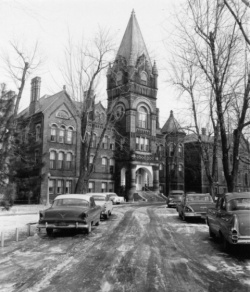Difference between revisions of "Fort Wayne Developmental Center"
m |
|||
| (One intermediate revision by the same user not shown) | |||
| Line 9: | Line 9: | ||
| construction_ended = | | construction_ended = | ||
| opened = 1890 | | opened = 1890 | ||
| − | | closed = | + | | closed = 2007 |
| − | | demolished = | + | | demolished = 2011 |
| − | | current_status = [[ | + | | current_status = [[Demolished Institution|Demolished]] |
| building_style = [[Cottage Planned Institutions|Cottage Plan]] | | building_style = [[Cottage Planned Institutions|Cottage Plan]] | ||
| architect(s) = | | architect(s) = | ||
| Line 18: | Line 18: | ||
| peak_patient_population = 2,700 in 1964 | | peak_patient_population = 2,700 in 1964 | ||
| alternate_names = <br> | | alternate_names = <br> | ||
| − | *Indiana School for Feeble Minded Youth | + | *Indiana Asylum for Feeble Minded Children |
| + | *Indiana School for Feeble Minded Youth | ||
*Fort Wayne State Hospital | *Fort Wayne State Hospital | ||
}} | }} | ||
| Line 35: | Line 36: | ||
file:Ftwayne2.jpg | file:Ftwayne2.jpg | ||
file:Ftwayne3.jpg | file:Ftwayne3.jpg | ||
| + | File:ftwayne.png | ||
</gallery> | </gallery> | ||
| Line 45: | Line 47: | ||
[[Category:Indiana]] | [[Category:Indiana]] | ||
[[Category:Cottage Plan]] | [[Category:Cottage Plan]] | ||
| − | [[Category: | + | [[Category:Demolished Institution]] |
[[Category:Institution With A Cemetery]] | [[Category:Institution With A Cemetery]] | ||
Latest revision as of 03:16, 30 August 2013
| Fort Wayne Developmental Center | |
|---|---|
 | |
| Construction Began | 1887 |
| Opened | 1890 |
| Closed | 2007 |
| Demolished | 2011 |
| Current Status | Demolished |
| Building Style | Cottage Plan |
| Location | Ft. Wayne, IN |
| Peak Patient Population | 2,700 in 1964 |
| Alternate Names |
|
History
In 1887, state legislators enacted a law providing for a new facility to be built in Fort Wayne. The "Indiana School for Feeble Minded Youth" opened its doors on East State Boulevard three years later and admitted 300 children. The young people enrolled at the new school took classes in art, music and gym. As they grew older, girls were taught laundry and domestic skills while boys were taught farming, carpentry, brick-making, and cobblery.
By 1918, the facility's population swelled to well over 1,000 and included adults as well as children. Overcrowding and old facilities led to the 1954 decision to transplant the school to Parker Place Farm, one of four farms it owned and the site of the present campus. The state constructed 18 buildings on the 142-acre site to meet the needs of the residents. The move began in 1960 and, in fewer than 10 years, the school's population exploded to more than 2,500. Some residents continued to live at the old school for about 20 years. After a number of years in which the State Street campus was inhabited by vagrants and rats, the Administration Building was demolished in 1982 to make way for North Side Park, which became Bob Arnold Northside Park. The Park Department saved a stone archway to leave as memorial to the former residents.
The facility was renamed the Fort Wayne State Developmental Center eight years later, and, in 1986, it made history once more when it became the first facility for the developmentally disabled (public or private, large or small) in Indiana to be accredited by the Accreditation Council on Services for People with Developmental Disabilities (ACCD). Amid controversy over it's closing, the announcement was made official in June 2007. Ivy Tech Community College has taken over the property and will begin demolition this summer to make room for it's new North Campus buildings.
Images of Fort Wayne Developmental Center
Main Image Gallery: Fort Wayne Developmental Center
Cemetery
There is one large stone, dated 1901 to 1967, but the graves were never marked. It is probable that some of those bodies supposedly buried at the school cemetery were instead donated for medical research. It is on the west side of St. Joe Road, between Broyles and Canterbury Boulevards, the graves are not marked.


